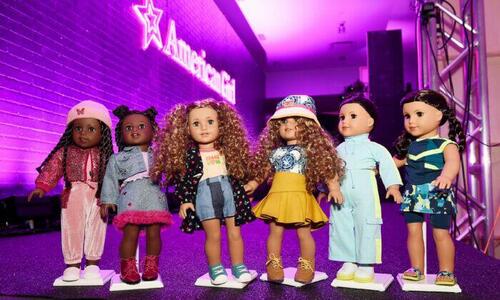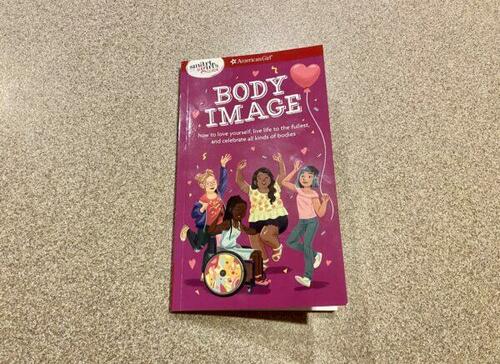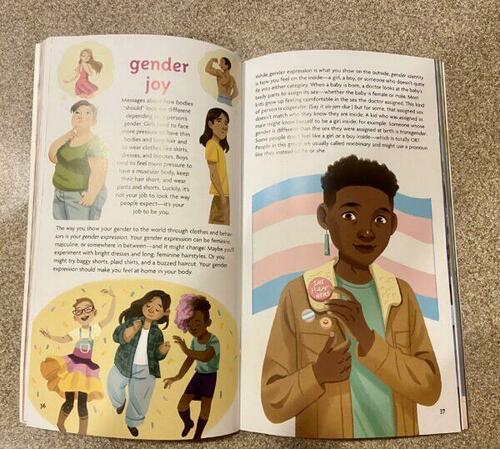
Authored by Darlene McCormick Sanchez via The Epoch Times (emphasis ours),
Scathing reviews are pouring into the American Girl website and Amazon, and social media users are blasting the popular doll brand for a 2022 book that advises young girls on pronouns, switching genders, and using puberty blockers.

Part of the criticism surrounds circumventing unsupportive parents.
Others, however, have applauded the book for providing guidance on the topics, sending it to No. 1 on Amazon in the category of Popular Adolescent Psychology.
“A Smart Girl’s Guide: Body Image: How to Love Yourself, Live Life to the Fullest, and Celebrate All Kinds of Bodies” rapidly drew attention from around the world after a Dec. 6 report in the London-based Daily Mail.

The $12.99 book was released in February without fanfare.
Amazon users suggest it’s written for ages 8–11; American Girl recommends it for girls in 4th grade through 6th grade.
The 96-page paperback by Mel Hammond depicts girls with different body types and skin colors on the cover. It further signals inclusiveness by showing a girl in a wheelchair and another with blue hair.
Hammond also wrote, “Love the Earth: Understanding Climate Change, Speaking Up for Solutions and Living an Earth-Friendly Life” for American Girl.
The 36-year-old company is best known for its lifelike dolls that can be customized by skin tone, eye color, and hair color and style.
The 18-inch dolls that stand on their own often are purchased to look like a child’s twin.

The company sells an expansive line of matching clothing for child and doll, and a library of books for girls on a wide variety of topics. It was purchased by toy giant Mattel—the owner of the Barbie brand of toys—in 1998 for a reported $700 million.
Early in “Body Image,” the author assures young girls that many different body types exist.
Halfway through the book, the Gender Joy chapter takes a hard-left turn.
It prominently features an illustration of an androgynous child wearing pronoun buttons in front of a transgender flag. The chapter defines terms like transgender and nonbinary, and suggests ways girls can express their gender through haircuts and clothing.
“When a baby is born, a doctor looks at the baby’s body parts to assign its sex—whether the baby is female or male,” the chapter explains. “But for some, that assigned sex doesn’t match who they know they are inside.”
Being transgender is not an illness or something to be ashamed of, the author reassures. The text advises girls to talk with a trusted adult, such as a parent or counselor, if they are questioning their gender identity.

“That person can connect you with a specially trained doctor, who can help you and your family decide what’s best for your body,” the book explains. And girls might want to experiment with wearing clothing and using preferred pronouns that make “you feel most like the true you.”
“Parts of your body might make you feel uncomfortable, and you might want to change the way you look,” the book says. “That’s totally OK!”
“If you haven’t gone through puberty yet, the doctor might offer medicine to delay your body’s changes, giving you more time to think about your gender identity,” the book advises.
Puberty blockers are hormone treatments that, in girls, can halt breast growth, cause facial hair to grow, and deepen the voice. While transgender supporters call them reversible, the impact on fertility is unknown.
Some in the medical field have raised grave concerns recently about the use of puberty blockers in children, citing side effects such as, at least temporarily, stopping growth in height, halting development of sex drive, interfering with fertility, and halting the healthy accumulation of calcium in bones.
The book encourages girls who’ve experienced puberty already to see a doctor if they’re questioning their gender. Studies show transgender and nonbinary kids who get help from doctors have better mental health than those who don’t, the chapter claims.
Proponents of children transitioning often use that argument to encourage it.
One 2022 study appearing in the Journal of the American Medical Association said that transgender patients, 13 to 20 years, who received puberty blockers and cross-sex hormones had significantly lower depression and suicidal thoughts.
Critics, however, say that the lucrative and growing transgender industry suppresses studies showing the opposite is true. The result is the irrevocable harm of children, they say.
A 2021 article published by the BJM, an international medical care advocacy group, found that children 12-15 with severe gender dysphoria had no significant effect on their psychological function, suicidal thoughts, or body image when using puberty-blocking drugs.
The American Girl “Body Image” book suggests parents don’t need to be included in these life-altering decisions. It advises young girls to seek out help from transgender groups, if necessary.
“If you don’t have an adult you trust, there are organizations across the country that can help you. Turn to the Resources on Page 95 for more information,” the chapter suggests.
Resources for those questioning their gender identity include website addresses for The Trevor Project, Human Rights Campaign, and GLSEN for gender-inclusive schools.
The Trevor Project is an LGBT advocacy group offering counseling and a chat feature for youths. The Human Rights Campaign pushes LGBT rights.
Promoting Critical Race Theory
The Gender Joy chapter also introduces children to the term “intersectionality” and provides a worksheet with blanks for listing characteristics, such as gender, race, and age.
Intersectionality is a concept used in Critical Race Theory (CRT) to point out a person’s overlapping belonging to multiple victim groups that subject them to discrimination.
CRT suggests a person with greater intersectionality is deserving of more preferential treatment as repayment for that oppression.
The book highlights the fictional character Ivy—a 10-year-old who is deaf, transgender, and Jewish—as a way of explaining intersectionality to young readers.
Read more here...
Authored by Darlene McCormick Sanchez via The Epoch Times (emphasis ours),
Scathing reviews are pouring into the American Girl website and Amazon, and social media users are blasting the popular doll brand for a 2022 book that advises young girls on pronouns, switching genders, and using puberty blockers.

Part of the criticism surrounds circumventing unsupportive parents.
Others, however, have applauded the book for providing guidance on the topics, sending it to No. 1 on Amazon in the category of Popular Adolescent Psychology.
“A Smart Girl’s Guide: Body Image: How to Love Yourself, Live Life to the Fullest, and Celebrate All Kinds of Bodies” rapidly drew attention from around the world after a Dec. 6 report in the London-based Daily Mail.

The $12.99 book was released in February without fanfare.
Amazon users suggest it’s written for ages 8–11; American Girl recommends it for girls in 4th grade through 6th grade.
The 96-page paperback by Mel Hammond depicts girls with different body types and skin colors on the cover. It further signals inclusiveness by showing a girl in a wheelchair and another with blue hair.
Hammond also wrote, “Love the Earth: Understanding Climate Change, Speaking Up for Solutions and Living an Earth-Friendly Life” for American Girl.
The 36-year-old company is best known for its lifelike dolls that can be customized by skin tone, eye color, and hair color and style.
The 18-inch dolls that stand on their own often are purchased to look like a child’s twin.

The company sells an expansive line of matching clothing for child and doll, and a library of books for girls on a wide variety of topics. It was purchased by toy giant Mattel—the owner of the Barbie brand of toys—in 1998 for a reported $700 million.
Early in “Body Image,” the author assures young girls that many different body types exist.
Halfway through the book, the Gender Joy chapter takes a hard-left turn.
It prominently features an illustration of an androgynous child wearing pronoun buttons in front of a transgender flag. The chapter defines terms like transgender and nonbinary, and suggests ways girls can express their gender through haircuts and clothing.
“When a baby is born, a doctor looks at the baby’s body parts to assign its sex—whether the baby is female or male,” the chapter explains. “But for some, that assigned sex doesn’t match who they know they are inside.”
Being transgender is not an illness or something to be ashamed of, the author reassures. The text advises girls to talk with a trusted adult, such as a parent or counselor, if they are questioning their gender identity.

“That person can connect you with a specially trained doctor, who can help you and your family decide what’s best for your body,” the book explains. And girls might want to experiment with wearing clothing and using preferred pronouns that make “you feel most like the true you.”
“Parts of your body might make you feel uncomfortable, and you might want to change the way you look,” the book says. “That’s totally OK!”
“If you haven’t gone through puberty yet, the doctor might offer medicine to delay your body’s changes, giving you more time to think about your gender identity,” the book advises.
Puberty blockers are hormone treatments that, in girls, can halt breast growth, cause facial hair to grow, and deepen the voice. While transgender supporters call them reversible, the impact on fertility is unknown.
Some in the medical field have raised grave concerns recently about the use of puberty blockers in children, citing side effects such as, at least temporarily, stopping growth in height, halting development of sex drive, interfering with fertility, and halting the healthy accumulation of calcium in bones.
The book encourages girls who’ve experienced puberty already to see a doctor if they’re questioning their gender. Studies show transgender and nonbinary kids who get help from doctors have better mental health than those who don’t, the chapter claims.
Proponents of children transitioning often use that argument to encourage it.
One 2022 study appearing in the Journal of the American Medical Association said that transgender patients, 13 to 20 years, who received puberty blockers and cross-sex hormones had significantly lower depression and suicidal thoughts.
Critics, however, say that the lucrative and growing transgender industry suppresses studies showing the opposite is true. The result is the irrevocable harm of children, they say.
A 2021 article published by the BJM, an international medical care advocacy group, found that children 12-15 with severe gender dysphoria had no significant effect on their psychological function, suicidal thoughts, or body image when using puberty-blocking drugs.
The American Girl “Body Image” book suggests parents don’t need to be included in these life-altering decisions. It advises young girls to seek out help from transgender groups, if necessary.
“If you don’t have an adult you trust, there are organizations across the country that can help you. Turn to the Resources on Page 95 for more information,” the chapter suggests.
Resources for those questioning their gender identity include website addresses for The Trevor Project, Human Rights Campaign, and GLSEN for gender-inclusive schools.
The Trevor Project is an LGBT advocacy group offering counseling and a chat feature for youths. The Human Rights Campaign pushes LGBT rights.
Promoting Critical Race Theory
The Gender Joy chapter also introduces children to the term “intersectionality” and provides a worksheet with blanks for listing characteristics, such as gender, race, and age.
Intersectionality is a concept used in Critical Race Theory (CRT) to point out a person’s overlapping belonging to multiple victim groups that subject them to discrimination.
CRT suggests a person with greater intersectionality is deserving of more preferential treatment as repayment for that oppression.
The book highlights the fictional character Ivy—a 10-year-old who is deaf, transgender, and Jewish—as a way of explaining intersectionality to young readers.
Read more here…
Loading…







